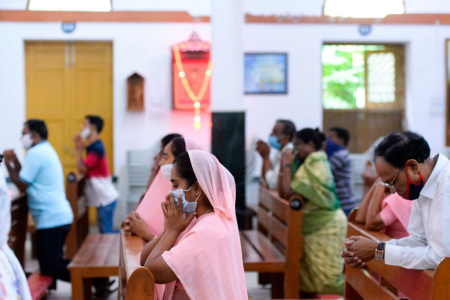Indian pastor arrested after holding mass on Christmas Day

Police in India's northern Uttar Pradesh state arrested two pastors under the state's “anti-conversion” law, alleging they converted people to Christianity through “enticement” or “force" during the Christmas season.
Pastor Paulus Masih, a resident of Rampur district, was arrested Monday on charges of “enticing” about 100 people on Sunday during a mass he held "in an open ground" in a village, The Times of India reported.
Senior police officer Sansaar Singh told the outlet that a case had been registered under Sections 3 and 5 of the Uttar Pradesh Prohibition of Unlawful Conversion of Religion Act of 2021 based on a complaint from Rajeev Yadav, who is described as a "right-wing activist."
"The pastor has been sent to jail," Singh was quoted as saying. "No prior permission was taken to hold the event.”
In a video, the 43-year-old pastor was alleged to have told the gathering “about the benefits of being a Christian."
According to the newspaper, Masih also told the crowd: “The motive of our prayer is not to hurt the sentiments of anyone but to worship our lord with utmost honesty.”
A local villager, who attended the religious gathering, was quoted as saying that the pastor said good things about his religion and talked about respect in society and free education.
Yadav alleged that Masih conducts meetings in the village every Sunday and is said to have converted many villagers.
While Christians comprise only 2.3% of India’s population and Hindus account for about 80%, nearly a dozen states have enacted anti-conversion laws. Proponents of such laws say they are needed to crack down on Christians or Muslims forcing or giving money to Hindus to persuade them to convert.
These laws typically ban conversion through coercion, allurement, fraudulent practices, marriage or misrepresentation. Hindu nationalist activists and groups have often used the laws to file allegations of forced conversion with police against religious minorities. The burden of proof falls on those accused to prove that conversions were not done in force.
In a separate incident, police in Uttar Pradesh's Sitapur district arrested Pastor David Asthana from Lucknow city under the anti-conversion law after receiving a complaint that he was attempting to convert people “forcefully” at an event held with about 200 people days before Christmas.
The area’s Additional Superintendent of Police N.P. Singh was quoted by Hindustan Times as saying that police did not find any person who had been converted at the event but is still investigating the case.
While the pastor’s wife, Rohini Asthana, was also named in the police complaint, she was not arrested due to the condition of her health, the officer said.
The officer added that four foreign nationals from Brazil were part of the event the pastor and his wife held.
“[The] process to deport them has been initiated after the couple failed to explain why they took the foreign nationals to a small village in Sitapur," Singh was quoted as saying.
Anti-conversion laws typically state that no one can use the “threat” of “divine displeasure,” which means Christians can’t talk about Heaven or Hell since it would be seen as luring.
Some of these laws have been in place for decades in some states. Radical Hindu nationalist groups frequently use these anti-conversion laws to make false charges against Christians and launch attacks under the pretext of an alleged forced conversion.
Open Doors USA, an organization that monitors persecution in over 60 countries, ranks India as the 10th-worst country in the world when it comes to Christian persecution. The group has reported a steady deterioration in religious freedom conditions for Christians since the rise of the Modi regime in 2014.
The organization reports that "Hindu extremists aim to cleanse the country of their presence and influence."
“The driving force behind this is Hindutva, an ideology that disregards Indian Christians and other religious minorities as true Indians because they have allegiances that lie outside India, and asserts the country should be purified of their presence," an Open Doors factsheet on India reads.
“This is leading to a systemic, and often violent and carefully orchestrated, targeting of Christians and other religious minorities, including use of social media to spread disinformation and stir up hatred.”





















